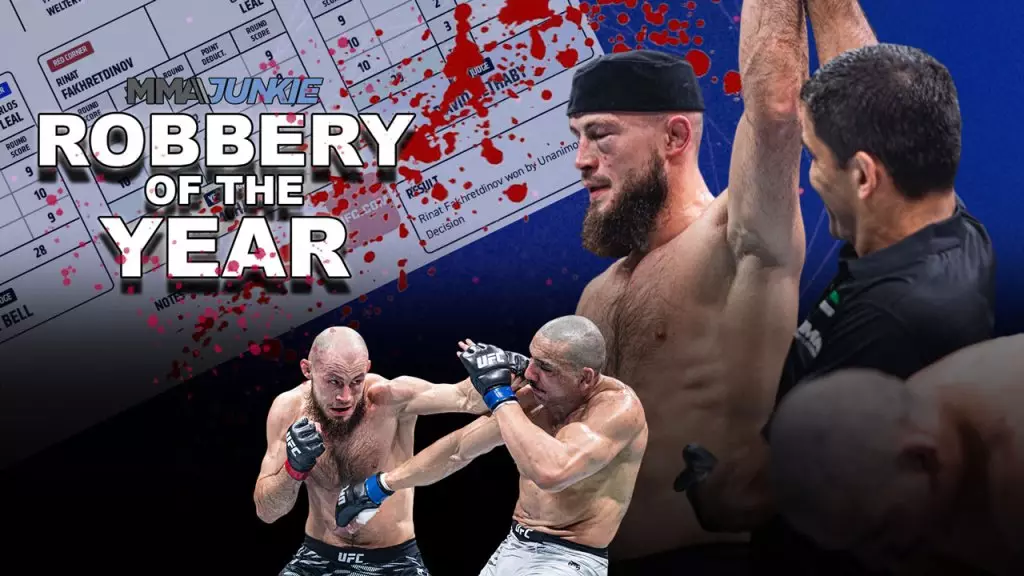The unanimous decision victory for Rinat Fakhretdinov against Carlos Leal at UFC 308 has sparked significant discourse among fans, analysts, and fighters alike. Controversy erupted when not a single media member agreed with the judges’ scorecards, outlining a failure in the scoring system that governs mixed martial arts. Fakhretdinov, boasting a record of 23-1-1 and making strides in the UFC with a 5-0-1 tally, saw his hand raised post-fight despite the overwhelming consensus pointing toward Leal as the real victor. The most glaring misstep came from one judge who submitted a bizarre 30-27 score, igniting passionate debates around the integrity of the scoring process in professional fighting.
From the onset, Fakhretdinov’s strategy seemed clear; he aimed to utilize leg kicks effectively while attempting takedowns to assert control. The first round presented a picture of Fakhretdinov landing some early leg kicks and managing a takedown. However, Leal’s resilience shone through as he quickly regained his vertical base and pushed back against the cage. The exchanges painted a do-or-die portrait of two fighters reluctant to submit to the other’s strength.
Leal differentiated himself by landing substantial shots that pivotally swayed the momentum in his favor. Notably, media scorecards reflected that Leal had landed more strikes in the first round, a statistical truth that contradicted the judges’ perspective. While Fakhretdinov’s physicality was evident, his body language and fading energy were negatively perceived by viewers, ultimately culminating in two judges opting to reward Fakhretdinov with the round.
In the second round, Fakhretdinov emerged with a newfound sense of urgency, revealing an apparent intention to turn the tide. However, Leal, exhibiting tactical groundwork, defended successfully against multiple takedown attempts. The Brazilian fighter’s striking prowess became increasingly visible, as he countered smoothly and landed consistent, damaging leg kicks. Fakhretdinov’s attempts at offense could not mask the fact that Leal was successively navigating the exchanges with cleaner and more impactful strikes.
As the final frames approached, Fakhretdinov’s unsuccessful attempts at takedowns continued, only to be countered by Leal’s strike combinations that visibly affected his opponent. The Brazilian’s efforts were punctuated by taking a brief advantage in the grappling exchanges, signaling his overall versatility and control. By the end of the third round, it was abundantly clear that Leal had earned the recognition for superior striking ability and capability to manage the pace effectively throughout.
The decision of the judges raises critical concerns about the criteria employed in scoring fights. This situation serves as a case study in the urgent need for reforms to ensure more consistent, fair scoring, as the implications of erroneous decisions ripple throughout the sport—affecting fighter careers, fan engagement, and the legitimacy of promotional narratives. Scores that deviate significantly from collective consensus threaten to undermine the foundational qualities of competition and fairness that are paramount in sports.
The UFC community now finds itself at a crossroads, with this mismatch inviting a broader evaluation of scorekeeping methods and suggesting potential improvements like increased use of technology for real-time data analysis and clearer scoring guidelines for the judges.
As discussions continue to evolve around the implications of the UFC 308 decision, one can hope for future enhancements in match officiating that would safeguard the integrity of outcomes. This fight should not merely be viewed as an isolated incident, but as motivation for the community to push for accountability and transparency in judging practices. Only by embracing such changes can the UFC continue to grow as a sport characterized by fairness, excitement, and respect for athletes who engage in the ring. The narrative surrounding Fakhretdinov and Leal’s fight serves as a reminder that while warriors may clash within the Octagon, the ongoing fight for fairness in judging is one that transcends individual bouts.

